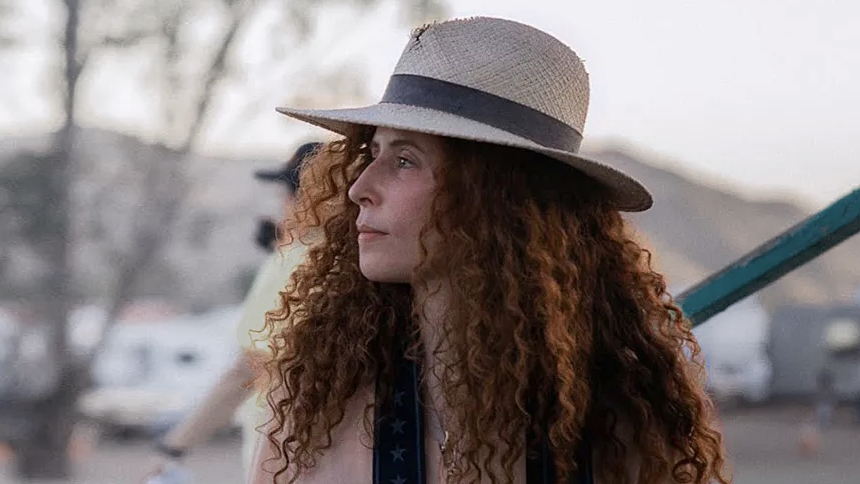Sound And Vision: Alma Har'el

In the article series Sound and Vision we take a look at music videos from notable directors. This week: two music videos by Alma Har'el.
Alma Har'el has been on the cusp of truly breaking through to the mainstream, and has been for a very long time. Ever since starting her film career with a handful of music videos and commercials, before making two lauded documentary-fiction hybrids, she has pursued a singular style and vision. The works of Alma Har'el are most notable for their seamless blend between fact and fiction, between documentary filmmaking and a more dreamlike process. The style of her work often blurs staged stilted scenes full of exaggerated colorful costumes and exaggerated often dance-like performances, with a more naturalistic shooting style: hand-held cameras, desaturated colors, real life environments and a fly-on-the-wal verite. The clash between the two already started in her VJ-ing days, where she used pre-existingly shot material and combined it with an on-the-fly live-element. Her VJ-career led to a career as a well-loved music-video director. One of her first videos was for Beirut's Elephant Gun (see below), and deserved many accolades.
It is not hard to see why: Har'el's style arrives almost fully-formed. The euphoric dancing and costuming of a group of seemingly drunk partygo-ers in vintage suits is beautiful and inspiring, but gives way to an equally beautiful, yet more sober shot of front-man Zach Condon playing his instruments on the beach. It's the blend between stagey performativity and documentary-like realism that Har'el does so well.
In her two documentaries Bombay Beach and LoveTrue, the first of which was scored by the aforementioned Condon, she finds really interesting and odd ways to emphasize certain details of the lives of real people. In Bombay Beach she does so by having them engage in dances and performances, all in the places and settings that these often down-on-their-luck people grew up in: the Salton Sea. It is a beautiful depiction of the lives of people who might have been exploited by another filmmaker for things like their political views or actions in the face of poverty. But if there is another thing that sets Har'el's work apart it is nuance and empathy.
We also see this in LoveTrue, which depicts three stories of loves gained and lost. Again, the shining humanity in the face of hardships comes through. Here Har'el has the subjects also perform scenes from their childhood in deliberately dream-like performances of subconscious woes. She also asks performers to portray potential future selves of her subjects, blending fact and fiction in more ways. For instance, one of the actors portraying the older self of one of the subjects, an erotic dancer, is an erotic dancer herself at the same club and points out the parallels between her and the other woman.
LoveTrue was produced by Shia LeBoeuf who also shows up in Har'el's fiction debut Honey Boy. Here the thing is that we can still talk about Har'el's usual blend between fact and fiction. LeBoeuf plays a version of his own father, while Lucas Hedges plays a version of LaBoeuf. The film is a passionate, empathetic depiction of cycles of alcoholism and abuse.
Here we do need to talk about the elephant in the room though. Shortly after Honey Boy came out, allegations came out of LeBeouf's pattern of abusive behavior towards women. Whereas Honey Boy itself was partly meant as an exploration of LeBeouf's media persona, which was that of someone who misbehaved drunkenly in public, the allegations that came after were darker and much more worrying. They involved LeBoeuf's ex-partner and Honey Boy co-star FKA Twigs, among several other women.
Har'el has spoken publicly in favor of FKA Twigs. The interesting thing is that Har'el has explored cycles of abuse as a theme before in her music videos, even starring LeBoeuf. The amazingly beautiful Fjögur Píanó (also below, if you can beat the age-restriction), by Sigur Rós, depicts LeBoeuf as an abusive man in a relationship with a victimized woman, while they both use substances. It's an never ending spiral, but Har'el finds ways to depict abuse symbolically and metaphorically where it never gets heavy-handed or in bad taste. It's a truly magnificent piece, which sadly might be overshadowed by the real-life allegations against LeBoeuf. I still want to single it out though.
As a critic I grapple with separating art from artistry, at times, especially when fact and fiction blur as much as they do with these LeBoeuf-centric Har'el pieces. I do not have a clear answer as of where I stand yet in the cultural discourse around abusers on screen, except to condemn the violence. But as to what to do with the fiction? I do not know. Outside of that I do think Har'el is a major talent, who does not deserve to be punished for the actions of others. She is an excellent, empathetic filmmaker, who made several stellar music videos, and I can't wait to see what she does next. I'm in luck: her new Apple+ television series Lady in the Lake (reviewed here by Peter Martin) premiered this week.







